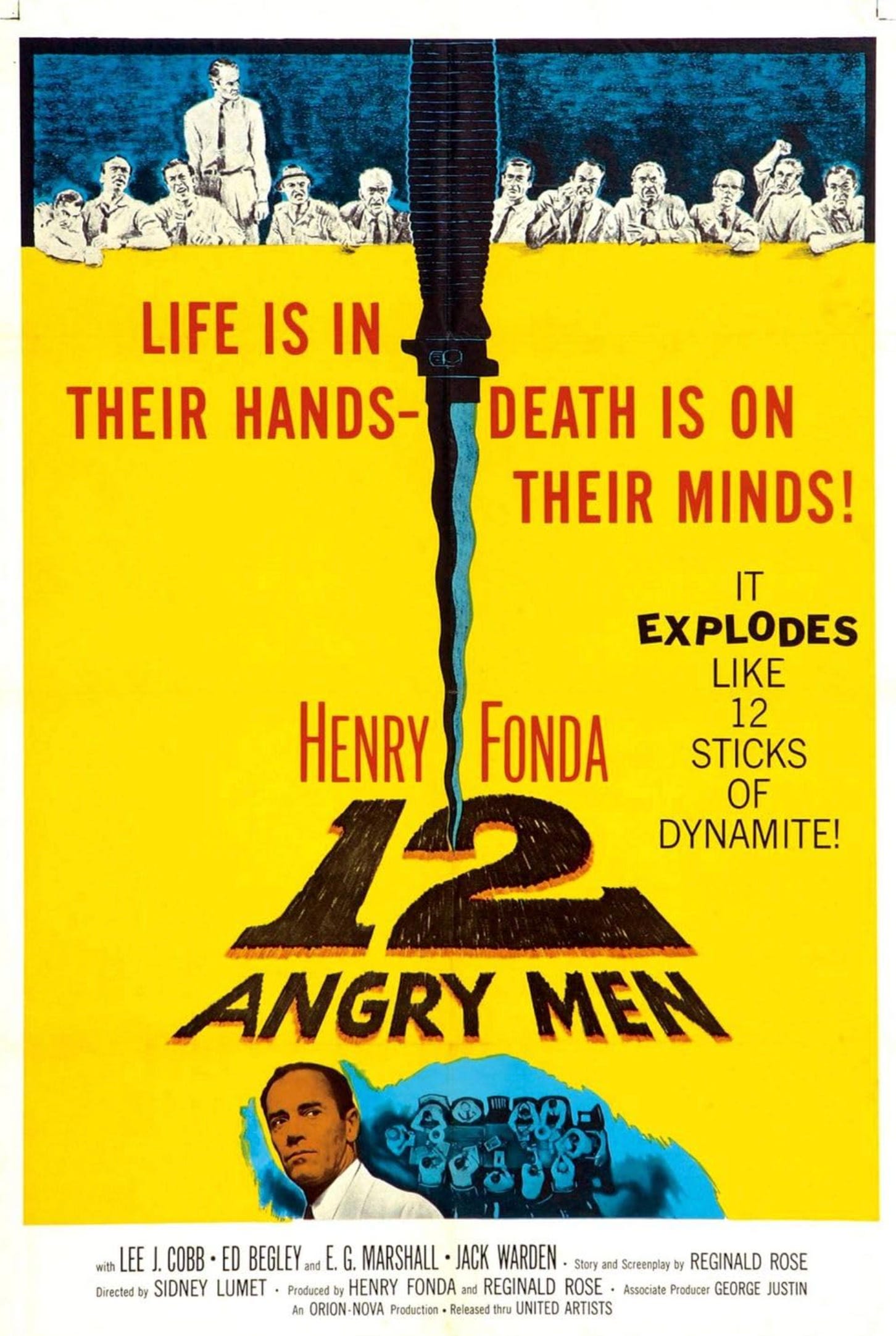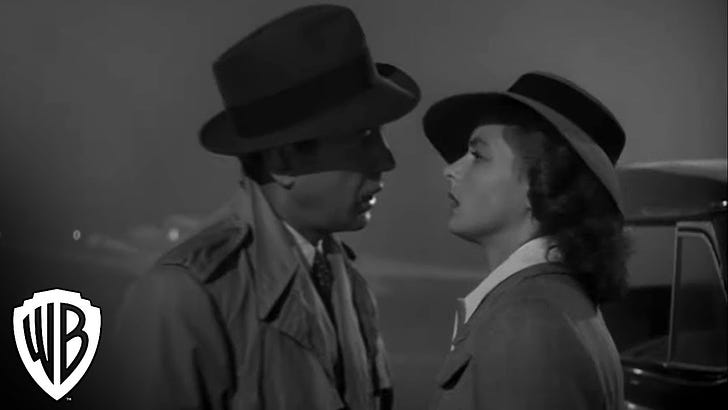This time around, we were pressed for time and chose a shorter film.
We have both seen this film and the remake multiple times. Kevin actually played one of the jurors in a community theater production of the story. It’s one of the top, if not the top, of all legal/courtroom dramas (maybe second to “To Kill a Mockingbird,” which we’ll have to watch soon.
We watched the version on Amazon, but it’s also available to stream in several other places. Naturally, DVD and BluRay editions are available as well.
Check out all our books with one easy link: https://brianschell.com/
12 Angry Men (1957)
Directed by Sidney Lumet
Written by Reginald Rose
Stars Henry Fonda, Lee J. Cobb, Martin Balsam
Run Time: 1 Hour, 36 Minutes
Trailer:
Spoiler-Free Judgment Zone
This is a combination of a powerhouse cast and a good script, which manages to make a movie that’s basically just an hour and a half of a dozen guys discussing a murder case while sitting around a table in a single room gripping and interesting. Will he be found guilty or innocent? Gotta watch it to see. Or just wait, and we’ll spoil it because it’s almost seventy years old, and it’s fair game.
Awful One-sentence Synopsis
A dozen angry guys hang out in a room and sweat.
Spoilery Synopsis
We pan up on a big, elaborate courthouse as people file in. We watch the judge giving instructions to the jury. They look like calm, rational men. The judge then dismisses the jury to deliberate. We see the accused, a sad-looking teenager of some kind of vague ethnicity (the original script has him as Puerto Rican, although it’s not obvious in the film). Credits roll as the twelve walk into the jury room and get settled in; right away, we see that the room is hot and the fan doesn’t work.
Juror 7 mentions that it’s going to be the hottest day of the year, and he’s obviously in a hurry. Juror 2 and 3 talk about the case, and Juror 3 says they could all save time by just slapping down those kids right away. Juror 12 talks about how exciting and fun it was to have a murder case.
They settle down to business and take a preliminary vote; it has to be unanimous. Everyone votes guilty– except Juror 8. He doesn’t really have an opinion; he just wants to go over the details. The accused stabbed his own father in the chest with a switchblade, and everyone says it’s an open-and-shut case. “We’re talking about somebody’s life here,” he adds. First, they argue about whether that kid even merits their discussion. “I’ve lived among them all my life. They’re born liars,” says Juror 10, who is obviously racist. Everyone gets a turn around the table to express their thoughts.
Juror 3 just says he thinks the kid did it. Jurors 3 and 10 go over the whole case, the evidence, and the witness. Others pipe in, and some stay mostly quiet. Eight refutes many of their points, not with evidence, but with doubts. Juror 3 is all about “kids today” being worthless and talks about his own son, who is now 22 and doesn’t talk to him anymore.
Number 8 eventually tells what he thinks; the public defender didn’t do a very thorough job– he barely questioned the witnesses. Could the witnesses be wrong? Juror 4 talks about that very distinctive knife the kid used and the way the witness claimed to be at the movies that night. As they argue about the knife’s uniqueness, Juror 8 pulls out its clone from his pocket; he bought it last night. Juror 7 makes jokes about missing his baseball game, so let’s hurry it up! Juror 8 asks for a secret ballot, and he’ll go with the unanimous verdict. This time, he’s not alone; Juror 9 changed his mind.
It’s break time. Juror 7 and 8 go to the bathroom and talk about salesmanship. Eight is clearly annoyed that 7 is rushing everyone to get out early. They’re all getting sweaty and annoyed with each other.
When they get back to it, they discuss an old man who was the first witness. The second witness says she saw the murder through the windows of a moving train. Seven takes the testimony of both witnesses and uses logic to show that some of what they said might not be reliable. Juror 9, an old man himself, has some insights into the elderly witness who heard the murder and may have only wanted attention. This causes Juror 5 to change his vote to “not guilty” as well. Juror 11 has some questions about why the boy went home after the murder.
Juror Ten goes on a long, shouty rant about details. Then they do another vote, and this time, 11 falls on the not guilty side, 8-4. Juror 3 goes on a rant and contradicts his own argument. He’s absolutely sure the kid is a murderer, but eight just says he’s a hateful jerk. They almost get into a fistfight, and everyone sees that three is a belligerent pig. Soon, it’s six to six, although some of the “guilties” don’t look so confident.
It starts to rain outside. Not only is 7 going to miss his ball game, but it’s gonna get even hotter with the windows closed. Juror 4 starts in, but relents when he can’t remember his own schedule and details about the movie he saw.
Juror 2, a short man, points out how the angle of the stab would make no sense for the accused. It looks for a minute like three is going to stab 8. Five adds details about the way the knife works. Seven starts having doubts now as well. Soon, it’s nine to three. Ten jumps and yells some more, but this time, he gets so over-the-top racist that others turn their back on him until he sees the error of his ways.
Number four still thinks the kid is guilty, and he bases his opinion on the woman eyewitness. Nine points out that Juror 4 is rubbing his nose where his glasses sit; so did the witness in question. She couldn’t have seen what she claimed to have seen. Four, twelve, and ten finally switch sides, leaving only Juror Three yelling about the kid being guilty.
Eight wants to hear Three’s arguments, and Three gets shouty again. He says all the facts don’t matter, he knows the kid did it, just like his own abandoned son. He calls them all “lousy bleeding hearts” and then tears up the photo of the son. He finally tearfully relents and goes “Not guilty.”
Juror One calls the bailiff; they are finally unanimous. Eight silently helps Three on with his coat; he doesn’t hold a grudge.
Brian’s Commentary
So… if the defense attorney had done his job, we could have gone home right away. All but three minutes are shot in one small room. It was nominated for three Academy Awards, but didn’t win any.
This was a remake of a 1948 “Studio One” television play. The film never officially made a profit, so Henry Fonda, who produced as well as starred, had negotiated a deferred share, but never got paid for the film, which he considered one of his best. He and Lee J. Cobb are really the two main characters, but the whole cast is excellent. There’s absolutely no action at all, but it never even hints at slowing down or getting boring.
While not all of the actors were household names at the time, essentially all 12 of the actors went on to have distinguished careers in Hollywood or on TV. The best part of the film are the characters; all twelve men are distinct and have real personalities, believable opinions and prejudices. It’s also interesting because in many ways, it is dated. They’re all white men, most aren’t ashamed of being bigots, ageists, everyone smokes and wears suits, and there are lots of little details, such as the ways they insult each other.
Kevin’s Commentary
I played Juror Number 4, the E.G. Marshall role, in a community theater production, which was a lot of fun. The stage script takes place in real time, much like the movie, but entirely on one set in the jury room. The table and room had to be shaped with a perspective so that everyone was at least angled forward toward the audience, with none of the twelve having their back to them. Switchblade knives were illegal to sell in the state at the time of the production, but you could buy a standard opening knife, and separately, you could buy a spring adapting kit with the warning how not to install it in the knife because that would make a switchblade, and you wouldn’t want that.
The cast here is a dozen guys who did hundreds of other things in movies and television both before and after this. They knew their craft, and it’s impressive how well they work together in this movie. It’s amazing how engrossing a bunch of guys yakking in a room can be.
Contact Info:
Email: mailto:email@horrorguys.com
Book Store: https://horrormonthly.com
Website: https://www.classicsweekly.com
Facebook: https://www.facebook.com/horrormovieguys
Mastodon: https://mastodon.social/@BrianSchell
Threads: https://threads.net/brian_schell
Twitter: http://twitter.com/HorrorMovieGuys
Theme song, "Boogie Party" Kevin MacLeod (incompetech.com) Licensed under Creative Commons: By Attribution 4.0 License http://creativecommons.org/licenses/by/4.0/










